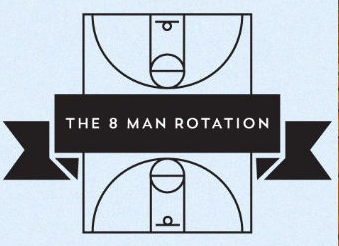Seems like it has been some time since I dropped a solid 8 Man Rotation contribution here on the blog, so to remedy that, please first take a look at this recent piece on ESPN.com, 'Fears that stats trump hoops acumen', a look at the tensions that are building inside NBA front offices and among team executives.
In case you didn't click over and read the piece, the gist is this: With the increased importance and weight that a new generation of NBA team owners are placing on data-driven decision making and analytical skills, that the traditional people that have been the talent pool for NBA team management and executive roles, (former NBA players), are under threat from a new kind of candidate - ones that have deep math, statistics, and data backgrounds and, importantly, not careers as actual basketball players.
Check this excerpt from the ESPN piece to get a feel for how this change in talent management and sourcing strategies is being interpreted by long time (and anonymously quoted) NBA executives:
Basketball guys who participated in the game through years of rigorous training and practice, decades of observation work through film and field participation work feel under-utilized and under-appreciated and are quite insulted because their PhDs in basketball have been downgraded," the former executive, who chose to remain anonymous, told ESPN NBA Insider Chris Broussard.
One longtime executive, who also chose to remain anonymous, postulated that one reason why so many jobs are going to people with greater analytical backgrounds is because newer and younger owners may better identify with them.
"Generally speaking, neither the [newer generation of] owners nor the analytic guys have basketball in their background," the longtime executive told Broussard. "This fact makes it easy for both parties to dismiss the importance of having experience in and knowledge of the game.
The piece goes on to say that since many newer NBA owners have business and financial industry backgrounds, (and didn't inherit their teams as part of the 'family business'), that they would naturally look for their team executives to share the kinds of educational and work experience profiles of the business executives with which they are accustomed to working with, and have been successful with.
The former players, typically, do not have these kinds of skills, they have spent just about all their adult lives (and most of their childhoods), actually playing basketball. A set of experiences, it is turning out, no longer seems to provide the best training or preparation for running or managing a basketball team.
But the more interesting point from all this, and the one that might have resonance beyond basketball, is the idea that the change in hiring philosophy is coming right from the top - from a new generation of team owners that have a different set of criteria upon which they are assessing and evaluating talent.
Left to tradition, hiring and promotion decisions would have probably only slowly begun to modernize. But a new generation of owners/leaders in the NBA are changing the talent profile for the next generation of leaders.
The same thing is likely to play out in your organization. Eventually, if it has not happened yet, you are going to go to a meeting with your new CHRO who didn't rise through the HR ranks and maybe is coming into the role from finance, operations, or manufacturing. In that meeting your 19 years of experience in employee relations might be a great asset to brag on. Or it might not be.
And you might find out only when you are introduced to your new boss, who has spent her last 5 years crunching numbers and developing stats models.
Have a great week!